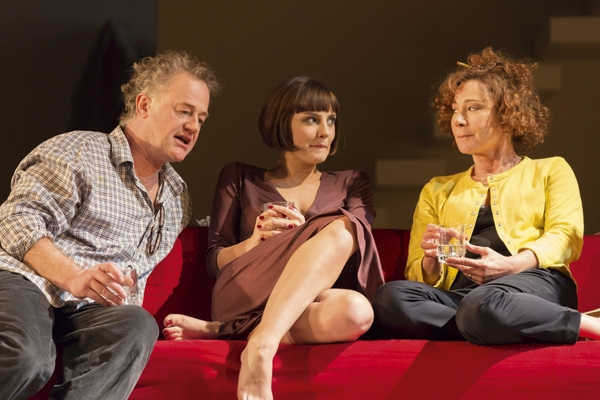How fashions change. Peter Nichols’s adultery drama, Passion Play, will seem tame and rather conventional to modern audiences. It was written in 1981 at a time when the rites and idioms of therapy hadn’t penetrated every level of our culture. Back then the candid scrutiny of one’s emotions, supervised by a ruminating analyst, was a thrilling and sophisticated novelty available only to high-earning fashion junkies. Today’s self-elevators choose different proofs of social altitude. They drink Bhutanese champagne, they purchase dachas in Moldova, or they holiday on the Great Barrier Reef in the family bathyscaphe.
Nichols sets his drama in a swish London suburb where James, an ageing art dealer, is seduced by Kate, a killer bimbo with a penchant for lovable old daddy-bears. David Leveaux’s production is stylish, snappy and great to look at. Owen Teale is pleasingly daft and vulnerable as the tousled rogue James. And Annabel Scholey is heart-thumpingly sexy as the granddad-grabber in a black suspender-belt. Oliver Cotton, who plays James’s inner voice, has such an extraordinary visual presence that he threatens to knock the play off course each time he bursts on stage. With his great black panda-eyes, and his surging mane of snowy white hair, he looks like a heroin-addicted Old Father Saturn standing in a wind tunnel.
Some of Nichols’s plotting is a little hard to swallow. In Act II he asks us to believe that Eleanor, having learnt of James’s adultery, would take Kate out on a shopping spree. No chance. Nichols also plays with the form and supplies James and Eleanor with an alter ego who articulates their private thoughts. The result is complicated, technically brilliant and dramatically rather distancing. What thrills us here is the playwright’s performance rather than the agonies and ecstasies of his characters. And because Nichols leaves Kate without a private voice he disrupts the balance of the play. We never discover what motivates her other than a perverse lust for balding scalps and sagging bellies.
There’s another snag as well. And this involves breaking a taboo. Zoë Wanamaker has overlooked the past 14 years in order to play Eleanor, 50, and although one shouldn’t mention tree rings at all, this large gulf coarsens the play’s emotional texture and deprives it of poignancy. A margin of 19 years between two rival women, as the script sets out, represents a far more intriguing and tricky dilemma than a margin of 34 years. Sorry to mention it but there it is.
Last year, the Liverpool Everyman commissioned Frank McGuinness, a playwright and lit-crit boffin, to investigate life in the crime-torn inner city and to reveal his findings to an eager world. Professor McGuinness chose to deliver his dramatised report through the eyes of Sal, a young single mum, whose 12-year-old daughter has been killed in a gangland crossfire mishap.
Without wishing to speculate on the professor’s personal experience of motherhood in northern English towns, I must point out that he gives Sal’s biography some very peculiar adornments. Sal raises her daughter alone while maintaining a car, a college career and three part-time jobs. She also acts as zoo-keeper to the family rabbit which — like many a pet ensconced in a Liverpool council estate — is named after the Roman playwright Terence.
Sal’s Irish parents are a pair of feckless whining brutes who label her ‘a thundering disgrace’ after she releases a press statement offering to forgive her daughter’s killer. ‘Get out of this house,’ her nasty dad tells her. Her even nastier mum flings a pile of condolence letters on to the floor and says, ‘I would not clean my arse with them.’ Vigilantes take revenge on the gun-toting gang and when Sal hears that the killer’s mother is herself bereaved, she sends her a gloating, facetious message. Sal turns out to be even colder and more misanthropic than her hideous parents. She ends the play as a borderline basket case.
Leanne Best, a well-drilled actress, was able to show us Sal’s nervous breakdown with a variety of stage techniques. She fell to the boards in a foetal shape — or possibly the recovery position — whimpering like a marmoset with tonsillitis. Then she stood bolt upright and delivered an award-winning emotional implosion, which involved much violent slapping-about of her shiny brown hairdo. This burst of percussion, I couldn’t help noticing, consisted of sideways blows calculated to send a nice resounding thwack across the footlights without damaging the precious noodle of the actress herself who — let’s be fair — must live to fight another day, and play another council-house nitwit. At the curtain call, some spectators were in tears. A few more were asleep. I was alert but unmoved. I’m afraid I didn’t believe a word of this.







Comments